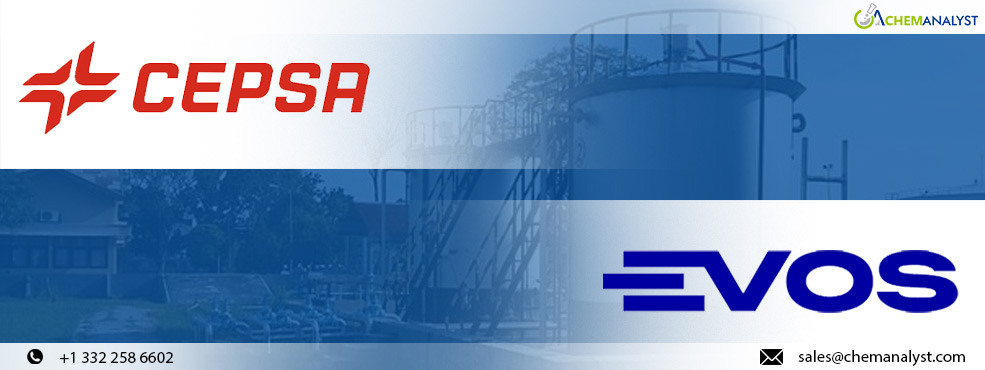Welcome To ChemAnalyst

Cepsa, a Spanish energy firm, has entered into an agreement with Evos, a prominent provider of liquid energy and chemical storage solutions with hubs strategically positioned across Europe. This collaboration aims to facilitate the storage of green methanol produced by Cepsa at Evos’ storage facilities located in Algeciras and Rotterdam. Additionally, the partnership encompasses the storage of green ammonia at Evos’ facilities in Algeciras, streamlining logistics for transporting green hydrogen products between pivotal ports in Spain and the Netherlands. Furthermore, Cepsa and Evos will collaborate on exploring logistics for other eco-friendly fuels, including Sustainable Aviation Fuel and renewable fuels derived from non-biological sources, as well as hydrogen carriers like Liquid Organic Hydrogen Carriers (LOHCs), at various terminals within the Evos network across Northwest Europe, including Amsterdam.
The signing of the agreement took place at the Port of Amsterdam, with Dutch Minister for Climate and Energy Policy and Deputy Prime Minister Rob Jetten in attendance.
Maarten Wetselaar, CEO of Cepsa, expressed, "Through strategic partnerships, Cepsa is establishing a network for the supply of green molecules extending from Spain to northern Europe. Partnering with Evos provides critical storage facilities, enabling the transit of green methanol manufactured in southern Spain to northern Europe. It reinforces the feasibility of our extensive green hydrogen initiatives. Last year, we unveiled plans for one of Europe's largest green methanol projects as part of our Andalusian Green Hydrogen Valley. This new partnership provides us with a comprehensive solution to deliver these green molecules to our customers in Northwest Europe, supporting decarbonization efforts continent-wide."
Harry Deans, CEO of Evos, remarked, "As Evos expands its presence within the Green Import Corridors of Northwest Europe and drives the development of our Algeciras terminal in Spain, we are delighted to collaborate with Cepsa to furnish vital infrastructure that accelerates the energy transition. This partnership will establish a South-North corridor for green hydrogen products, perfectly aligning with the strategy of our eight terminals, strategically positioned in key ports, to spearhead the energy transition alongside our clients."
Cepsa, in collaboration with partners, is advancing the development of the Andalusian Green Hydrogen Valley, which will encompass two green hydrogen plants boasting a combined capacity of 2 GW, a green methanol facility targeting an estimated annual production of 300,000 tons, and a green ammonia plant with a potential yearly output of up to 750,000 tons. Additionally, Cepsa has initiated the construction of a second-generation biofuels plant in Huelva, as part of a joint venture with Bio-Oils, set to become the largest facility of its kind in southern Europe. This plant will have the flexibility to produce 500,000 tons of Sustainable Aviation Fuel (SAF) and renewable diesel annually.
Evos is bolstering its strategic footprint within the Green Import Corridors of Northwest Europe, concentrating on the storage and management of green hydrogen derivatives and renewable fuels. Simultaneously, in Spain, Evos is advancing the enlargement of its Algeciras terminal to function as a hub for renewable exports. Infrastructure for green bunker fuels, including green Ammonia and green Methanol, is being developed across all Evos terminals.
Already integral to Evos' portfolio, the storage and management of SAF are poised for further growth in the foreseeable future. Working in collaboration with partners, Evos endeavors to spearhead an integrated terminal model, incorporating nearby green fuel production facilities, to amplify carbon reductions and bolster the Energy Transition.
Green methanol is produced using green hydrogen and carbon derived from non-fossil sources, either captured from the atmosphere or sourced from agricultural and forestry waste. It serves as a sustainable alternative to fossil-based methanol, effectively curbing carbon emissions, particularly in challenging sectors like long-distance shipping, as well as other industries such as chemicals and plastics.
By 2050, the global demand for methanol is projected to triple, reaching approximately 300 million tons annually, with a significant portion being attributed to green methanol. Cepsa has already forged partnerships to establish a green hydrogen corridor between the Port of Algeciras and the Port of Rotterdam, collaborating with the Port of Rotterdam and ACE Terminal for green ammonia storage, and securing agreements with Gasunie, a Dutch company, to access its green hydrogen transport network. This network is set to link with industrial hubs in the Netherlands, Germany, and Belgium as part of the Delta Corridor initiative.
We use cookies to deliver the best possible experience on our website. To learn more, visit our Privacy Policy. By continuing to use this site or by closing this box, you consent to our use of cookies. More info.
